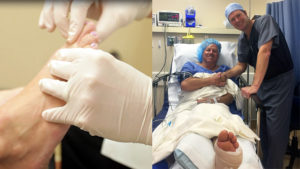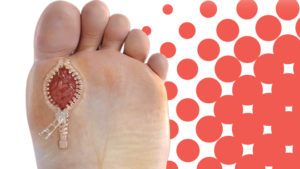Ingrown toenails can be significantly inconvenient sometimes. Individuals who habitually trim their toenails extremely short often suffer from painful ingrown toenails. During this condition, the edge of the toenail grows into the surrounding skin and causes discomfort.
When left untreated, ingrown toenails can cause inflammation, pain and swelling. It may also lead to severe infections. Hence, immediate medical attention is necessary for ingrown toenails. In some cases, ingrown toenails can be treated at home but seeking professional care from a foot doctor is highly recommended. Today’s post provides a discussion on the treatment choices for ingrown toenails and the benefits of scheduling an appointment with a Podiatrist in Tustin CA.

How to identify ingrown toenails?
A range of symptoms characterized the condition of ingrown toenails. For some ingrown toenails can be extremely painful and for some, the condition gets better after a few days of tenderness at the affected site. Below are the most common symptoms to identify the condition of ingrown toenails.
- Redness and swelling around the affected area
- Tenderness in the toenail
- Difficulty in wearing shoes
- Difficulty in walking
- Pus drainage or foul odor in the affected area
Slight tenderness is a sign of a mild condition of ingrown toenails, however, if any signs of infection are observed, it is best to reduce the risk of complications and immediately consult with a podiatrist.
What causes ingrown toenails?
Studies suggest that the condition of ingrown toenails is more common in adults compared to children. The condition occurs when trimmed toenails start to grow into the surrounding skin. Individuals with curved or thick nails are prone to developing such conditions.
Additionally, ill-fitted footwear can also contribute to the problem. Individuals who wear tight shoes or engage in activities like dancing or running are more likely to develop ingrown toenails.
How to treat ingrown toenails at home?
The American Academy of Family Physicians stated that the condition of ingrown toenails affects around 20% of the population. Since it is a common nail condition, most individuals are already aware of the problem and try to treat it at home. It is important to understand that only mild cases should be treated at home. In case of complications or signs like infection, it is best to seek professional assistance.
- Soak your feet: Use warm water to soak your feet. This is a useful remedy to reduce swelling and pain.
- Over the counter medications: You may apply creams or ointments to reduce inflammation and promote healing.
- Footwear: Choose comfortable footwear with wider leg room. The idea is to reduce pressure on your toes.
- Feet hygiene: In case of moisture or lack of hygiene around the affected, the likelihood of infection increases. Hence, it is important to keep the feet clean and dry.
If none of these remedies fail to work, resist the urge to trim the toenail on your own. It might lead to severe complications.
What are the risks of treating ingrown toenails at home?
The estimated cost of ingrown toenail treatment is $2 billion per year. This included medical expenses and lost productivity. Individuals who attempt to treat ingrown toenails without any knowledge can worsen the condition. Moreover, waiting for the symptoms to get better on their own can even lead to complications.
Self-treatment can be considered for mild conditions, however, lack of knowledge can be fatal for the overall health. Here are the risk factors associated with self-treatment of ingrown toenails:
- Lack of appropriate treatment tools can cause serious injuries
- Improper treatment leads to severe complications like abscesses and bone infections
- Untreated toenails even lead to loss of the affected toenail
- Delayed treatment makes foot surgery essential
For safe and effective treatment it is best to consult a podiatrist on time.
What are the benefits of visiting a foot doctor for ingrown toenails?
Podiatrists are trained professionals, they are highly experienced in the treatment of ingrown toenails. It is best to consult a medical professional because:
- Podiatrists provide safe and effective treatment
- Their experience is useful in reducing the risk of complications
- Timely professional assistance promotes faster healing
What are the treatment options for ingrown toenails?
A range of treatments are available for ingrown toenails. Depending on the severity of the condition, a podiatrist may select any of the below-listed treatment options:
- Antibiotics: For infected ingrown toenails, your foot doctor may prescribe antibiotics. These effectively work on infections and should only be consumed when directed by your podiatrist.
- Nail removal: If the condition gets severe then your podiatrist may partially remove the affected part of the toenail.
- Foot surgery: There are various types of foot surgery for the treatment of toenails. In case of recurring ingrown toenails, podiatrists may choose to surgically remove the affected toenail.
The condition of an ingrown toenail sometimes gets better on its own. If you are experiencing any discomfort around your toenail, you can wait or try at-home treatment only for a few days. If the problem persists or the toenail doesn’t respond to home care, immediate professional care is recommended.
Can you prevent ingrown toenails?
There are several ways to prevent ingrown toenails. For instance, the toenails should be trimmed straight across, rounding the corners might cause the problem of ingrown toenails. Additionally, one must pay attention to foot hygiene and wear comfortable footwear.

Athletics or any individual putting too much pressure on their feet, should wear properly fitted footwear and consult a podiatrist regularly to reduce the risk of toenail complications or foot deformities.
Conclusion
Ingrown toenails are a common problem that causes severe pain and discomfort. At home-care is useful for mild cases of ingrown toenails, however delaying treatment increases the likelihood of complications. Reduce the risk of infection or permanent loss of toenails by getting timely treatment from the highly experienced podiatrists at Orange County Foot and Ankle Group. Their doctors are experts in the medical and surgical care of ingrown toenails. The board-certified podiatrists are also a top-rated choice for diabetic foot care and sports injuries treatment.
























